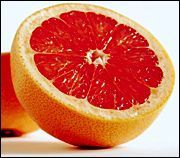The most important relationship I seek to nurture in the treatment room is the one a patient has with their own body. We live in a culture that teaches us to override pain, defer to outside authority, and push through discomfort. Patients often arrive hoping I can “fix” them, but the truth is, we can’t do the work for them. We can offer guidance, insight and support, but healing requires their full participation.
Vitamins, Minerals and Dietary Supplements
Naringin
What is naringin? Why do we need it?
Naringin is a type of flavonoid, a water-soluble pigment, found in grapefruits. By itself, naringin has little nutritional value, other than being responsible for giving grapefruit its bitter flavor, and possibly enhancing one's sense of taste. As a dietary supplement, however, naringin has a wide range of benefits.
Naringin appears to interfere with the activity of several enzymes that are responsible for the breakdown of certain nutrients in the intestines, along with many types of drugs, resulting in higher levels of those substances in the blood. As such, naringin is used to enhance the effectiveness and increase the half-life of several supplements and related substances, such as caffeine.
How much naringin should I take?
 Most studies have shown that a dose of 25 milligrams of naringin is enough to increase the bioavailability and half-life of certain nutrients and/or drugs consumed with it.
Most studies have shown that a dose of 25 milligrams of naringin is enough to increase the bioavailability and half-life of certain nutrients and/or drugs consumed with it.
What forms of naringin are available?
The main source of naringin is pure grapefruit juice. However, many types of grapefruit juice are either blended with other juices, or use grapefruits that have low naringin levels, to help remove bitterness and improve taste. Naringin supplements are also available, and are sold in pill, liquid and capsule form.
What can happen if I take too much naringin? Are there any interactions I should be aware of? What precautions should I take?
Because naringin can alter the metabolism of certain drugs so that they remain in the bloodstream longer, taking naringin supplements can result in higher-than-expected levels of those drugs in the blood, which may cause a variety of unwanted side-effects. As a result, patients should not take any drugs with naringin or grapefruit juice without first consulting a licensed health care provider. In addition, the effects of taking naringin and/or drinking grapefruit juice are cumulative; the more naringin that is ingested, the greater its interaction with certain drugs and other nutrients.
Among the drugs known to be affected by naringin are calcium channel blockers; estrogen supplements; sedatives; high blood pressure medications; and cholesterol-lowering medications. As always, make sure to consult with a licensed health care provider before taking naringin or any other herbal remedy or dietary supplement.
References
- Balestrieri ML, Castaldo D, Balestrieri C, et al. Modulation by flavonoids of PAF and related phospholipids in endothelial cells during oxidative stress. J Lipid Res Feb 2003;44(2):380-7.
- Fuhr U, Klittich K, Staib AH. Inhibitory effect of grapefruit juice and its bitter principal, naringenin, on CYP1A2 dependent metabolism of caffeine in man. British Journal of Clinical Pharmacology 1993;35:431-436
- Ho PC, Saville DJ, Wanwimolruk S. Inhibition of human CYP3A4 activity by grapefruit flavonoids, furanocoumarins and related compounds. Journal of Pharmacy and Pharmaceutical Sciences 2001;4:217-227.
- Jeon SM, Bok SH, Jang MK, et al. Comparison of antioxidant effects of naringin and probucol in cholesterol-fed rabbits. Clin Chim Acta Mar 2002;317(1-2):181-90.
- Kumar MS, Unnikrishnan MK, Patra S, et al. Naringin and naringenin inhibit nitrite-induced methemoglobin formation. Pharmazie Aug 2003;58(8):564-6.


